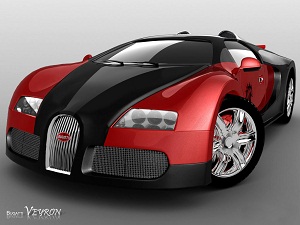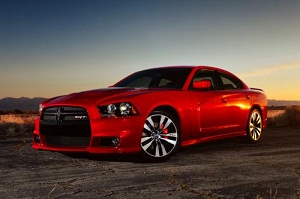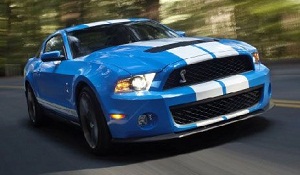Qualifying Remarks
Determining the “fastest” car depends on what you mean by “fastest” – and what you mean by “car.”
The rocket-powered sleds that compete for the top land speed record are often referred to as “cars” but are clearly something else entirely.
The term “fastest” has its own classifications. Are we talking top speed, 0-60, a quarter mile, or the car that can make it coast-to-coast the fastest? There are a lot of factors to consider – and, unless we provide some basic parameters to this evaluation, we might as well be discussing how many angels can fit on the head of a pin.
If we are talking about something built by a manufacturer (excluding tuners) offering a warranty, that can be registered and driven on U.S. roads, and that has bona fide dealerships in the United States, well, the fastest car is … technically speaking … a Volkswagen.
The Penultimate Speed Machine – Best Car for Speed
It’s the Bugatti Veyron Super Sport. (Bugatti SAS is owned by the Volkswagen folks, it is technically a Volkswagen brand).

Fastest Volkswagen ... ever!
The Bugatti Veyron’s W16 engine (yes, 16 cylinders) comes with 4 turbochargers and 4 valves per cylinder. Its lineage traces to the Volkswagen W12 engine that powered the Volkswagen Phaeton luxury performance sedan. It’s just bigger – a lot bigger.
The Veyron’s W16 engine represents nearly 500 cubic inches of displacement. At 487 cubes it is the largest engine in a production, non-commercial vehicle at this time. The GM Performance ZZ572, 9.4 L (572 cu in) V8 engine is larger, but it is a “crate engine” – not available in a production GM car.
Bugatti claims the engine produces 1,200 brake horsepower – meaning this is a horsepower rating at the flywheel with no parasitic drag from an exhaust system, transmission, alternator, etc. This means this engine is putting nearly a thousand horsepower (987 to be exact) to the ground via its AWD system.
The Veyron Super Sport weighs in at just over 2 tons, just less than 4,200 lbs., making it the same approximate weight of a Dodge Charger SRT8. The Charger SRT8 comes stock with only 470 horsepower, less than half of what the Veyron Super Sport produces.
Many are surprised the Veyron weighs this much considering how much carbon-fiber is used in its construction, but a lot of that weight is needed just to produce that type of power. The enormous engine block, 4 turbochargers, 10 radiators, AWD system and enormous wheels/tires/brakes all add up.
Still the Bugatti Veyron Super Sport is the performance benchmark for production vehicles, even though annual production is about 50 units per year and the cost is approximately (depending on exchange rates) $2.4 million dollars.
The benchmarks are remarkable:
0-60 2.5 seconds
1/4 mile 9.8 seconds
0-100 5.2 seconds
Top Speed 268 mph
But other than bragging rights, what does $2.4 million buy you? Well, outside of the “cool” factor and a stupid amount of speed, not that much. It does come with a lot of overhead, though.
If by chance you need to change tires, you need to ship the wheels/tires to France (where the car is built) to have Bugatti take care of it. Not that you expect to get much life out of them
Bugatti recommends replacing the Michelin Pilot Sport 2s using Bugatti’s special compound every 2,500 miles. They recommend changing the wheels and tires every 10,000 miles. The cost for wheels and tires is somewhere between $50-70,000.
These type of things make the Veyron more of an inanity than an exercise in vanity, but an argument in either direction is easily made; but what cannot be argued are the performance benchmarks.
Best Cars for Speed (Fastest cars) for the Long Haul
Background
The Bugatti is a compelling pick for 1st place, but how many of us are out there with $2.4 million of discretionary income to plunk down on a car? Not many.
To be a “best car” for speed we need to think about something almost counterintuitive: stopping it. There are a lot of fast cars out their now, but unless they can bleed that speed effectively, what’s the point? Personally, I’m not looking for a car to provide some sort of optimal impact speed.
The joy of fast cars is making typically difficult things seem much easier. Whether it’s passing another car, turning an on-ramp into a virtual catapult, or covering vast distances in abbreviated periods of time, a best-car-for-speed will give you thrills yet provide an adequate amount of safety to get you their alive. It’s also important that the amount of noise, vibration, and harshness (NVH) you experience since these factors help determine how fatiguing the driving experience is.
These are characteristic of “grand touring” cars – the best cars for long-distance speed. These are cars that can gobble interstate highway miles with remarkable ease and leave the driver none the worse for the effort.
Selection: Chrysler 300C SRT8, Dodge Challenger SRT8, Dodge Charger SRT8
 In the arguable benchmark of “affordable” being defined at anything listing for under $50,000 MSRP – a price point that is somewhat arbitrary, but is probably the entry point for viable Grand Touring-type vehicles. You can spend more, but the value-to-expense ratio becomes much less advantageous as you do so. Hence, the best car for speed would be Chrysler’s LX family with the SRT8 designation.
In the arguable benchmark of “affordable” being defined at anything listing for under $50,000 MSRP – a price point that is somewhat arbitrary, but is probably the entry point for viable Grand Touring-type vehicles. You can spend more, but the value-to-expense ratio becomes much less advantageous as you do so. Hence, the best car for speed would be Chrysler’s LX family with the SRT8 designation.
The Chrysler 300C SRT8, Dodge Challenger SRT8, and Dodge Charger SRT8 are my picks for “best cars for speed.” They are large, comfortable vehicles whose lineage traces to the Mercedes sedans of yore. Their 470 horsepower V-8s may still leave them a click or two slower than the fabulous pony cars like the Ford Mustang GT or Chevrolet’s Camaro at the autocross, but they have much longer legs.
The SRT8’s are capable of sustaining triple-digit speeds for as long as the fuel holds out with minimal discomfort. There is sufficient interior space to make long-distance hauls a pleasure and the suspension tuning is autobahn-perfect. In fact, one of the design parameters for the SRT8 models was to support a 150 mile-per-hour lane change, so considerable design and engineering effort went into providing the aerodynamics and suspension – not too mention power – to meet this requirement.
The SRT8 models have a top speed in the range of 165 mph, although many owners claim top speeds in stock SRT8’s over a bit over 170 mph. There is no speed limiter, which is something of an inanity, but it does give these Chrysler vehicles an edge in this narrow comparison.
The standard brakes – multi-piston Brembos front and rear provide a lot of whoa to the SRT8’s go. Stopping distance from 60 mph is in the range of 110 feet.
In terms of safety, the SRT8 models feature stability control plus front and side-curtain air bags, and receives a 5-star crash rating for frontal impacts.
If you are looking for fairly startling acceleration, a high top-end, a modicum of comfort that make a 300-mile sojourn seem trite, and you don’t want to pay more than 50-large, then the an SRT8 is an obvious pick as “best car for speed.”
0-60 4.7 seconds
1/4 mile 12.8 seconds
Top Speed 175 mph
Best Cars for Speed (Fastest cars) for the Short Haul
Background
Suppose your intent is simply to get from Point A to Point B in a short amount of time, and your seat time is going to be less than an hour?
Keeping the $50,000 price limit in mind, there are a plethora of contenders for excellence in this particular category.
Selection: Ford’s Mustang Shelby GT500 Coupe
 Ford’s Mustang Shelby GT500 Coupe, purchased with no options, comes in just under $50,000 MSRP and is probably the fastest car you could have for a short dash. It’s also a competent long-hauler, although its smallish 16 gallon fuel tank could mean an additional fuel stops on longer trips. Its top speed is governed to not exceed 155 mph.
Ford’s Mustang Shelby GT500 Coupe, purchased with no options, comes in just under $50,000 MSRP and is probably the fastest car you could have for a short dash. It’s also a competent long-hauler, although its smallish 16 gallon fuel tank could mean an additional fuel stops on longer trips. Its top speed is governed to not exceed 155 mph.
The 5.4 liter aluminum block V-8 is supercharged and provides 550 horsepower. Getting to 60 mph takes but 4 seconds and the quarter mile will flash by in less than 13 seconds. The standard Brembos will bring this Shelby from 70-0 in 150 feet. The Shelby GT500 will pull nearly a full g in turns before traction will slip.
It’s a 2+2 coupe with well-bolstered seats and its IIHS Crash Rating is “Acceptable” but protection of front seat passengers gets the top rating of “Good”. Dual front and side airbags are standard.
It’s a purpose-built vehicle – and the purpose is to go fast, turn fast, and stop fast. It does all three with aplomb.
0-60 4.1 seconds
1/4 mile 12.4 seconds
Top Speed 155 mph
For about $10k less the 2012 Ford Mustang Boss 302 will provide nearly identical and should be considered a second choice considering how close the Shelby GT500 Coupe comes to our $50,000 baseline.
Final Thoughts
The base Chevrolet Corvette has an MSRP of $49,900 and offers comparable performance to the Shelby GT500 and might be a contender for long-haul and short-haul honors. It offers not only remarkable performance, but awesome fuel economy. But, it’s a car you fall into and roll out of, and it’s significantly more cramped than the other cars considered.
There are also imported cars that are notable contenders in this category such as the Nissan 370Z, Subaru WRX STi, Mitsubishi Evo X, Mazda RX-8 and Infinity G37; however, although all of these are excellent rides, none of these is remotely close to matching the overall performance of the cars selected as “best cars” for speed.






{ 2 comments… read them below or add one }
Not particularly a car guy, but I’m interested in your opinion and enjoy your writing. Good article. Also I found a couple typos.
“Their 470 horsepower V-8s may put still leave them a click or two slower than the fabulous pony cars like the ”
-Couldn’t decide here?
approximately (depending on exchange rates) approximately $2.4 million dollars.
Thanks for the edits!
This particular post had a lot of them. Looks like I picked the wrong week to stop smoking opium.
{ 2 trackbacks }